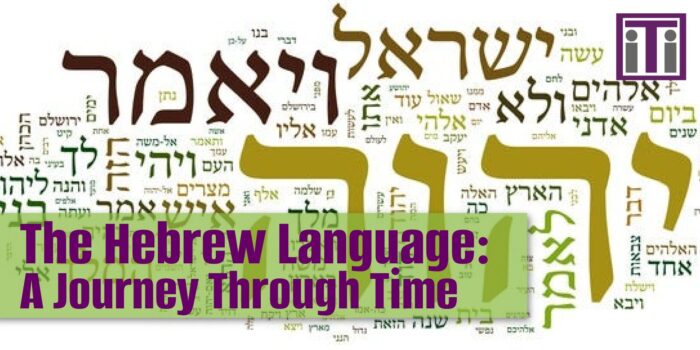The Hebrew Language: A Journey Through Time
Reading Time: ~5 mins

The Hebrew Language and Its Significance in Rosh Hashanah
The Hebrew language, one of the oldest languages still in use today, holds a profound place in the hearts of millions around the world. As the liturgical language of Judaism, Hebrew is not just a means of communication, but a vessel of cultural and religious heritage. This blog post explores the rich history of the Hebrew language and its integral role in the celebration of Rosh Hashanah, the Jewish New Year. By understanding the connection between Hebrew and Rosh Hashanah, we can appreciate the depth of tradition and the importance of language in preserving cultural identity.
The Origins and Evolution of the Hebrew Language
Hebrew, a member of the Northwest Semitic group of languages, has a history that spans over three millennia. It is the language of the Hebrew Bible (Tanakh), which has been a cornerstone of Jewish religious life. The earliest form of Hebrew, known as Biblical Hebrew, was used from around the 10th century BCE until the 4th century BCE. This ancient language evolved through various stages, including Mishnaic Hebrew, Medieval Hebrew, and Modern Hebrew.
Modern Hebrew, or Ivrit, was revived in the late 19th and early 20th centuries by Eliezer Ben-Yehuda and other Zionist pioneers. This revival transformed Hebrew from a language of religious texts to a living, spoken language, making it the official language of the State of Israel. Today, Hebrew is spoken by millions of people worldwide and continues to be a symbol of Jewish identity and continuity. The demand for Hebrew language translation continues to grow.
The Significance of Hebrew in Jewish Culture
Hebrew is more than just a language; it is a key to understanding Jewish culture, religion, and history. The Hebrew language is deeply intertwined with Jewish rituals, prayers, and holidays. It is the language in which the Torah, the central reference of the religious Judaic tradition, is written. Hebrew prayers and blessings are recited daily, and Jewish children learn Hebrew from a young age to connect with their heritage.
One of the most significant Jewish holidays where Hebrew plays a central role is Rosh Hashanah. This holiday, which marks the beginning of the Jewish New Year, is a time of reflection, prayer, and renewal. The Hebrew language is essential in the observance of Rosh Hashanah, as it is used in the liturgy, prayers, and traditional greetings.
Rosh Hashanah: The Jewish New Year

 Rosh Hashanah, which means “Head of the Year” in Hebrew, is celebrated on the first and second days of Tishrei, the seventh month of the Hebrew calendar. It is a time for Jews to reflect on the past year, seek forgiveness, and make resolutions for the coming year. The holiday is marked by various customs and rituals, many of which are steeped in Hebrew tradition.
Rosh Hashanah, which means “Head of the Year” in Hebrew, is celebrated on the first and second days of Tishrei, the seventh month of the Hebrew calendar. It is a time for Jews to reflect on the past year, seek forgiveness, and make resolutions for the coming year. The holiday is marked by various customs and rituals, many of which are steeped in Hebrew tradition.
One of the central rituals of Rosh Hashanah is the blowing of the shofar, a ram’s horn, which is mentioned in the Hebrew Bible. The shofar blasts serve as a call to repentance and a reminder of the covenant between God and the Jewish people. The Hebrew prayers recited during Rosh Hashanah, such as the “Avinu Malkeinu” (Our Father, Our King) and the “Unetaneh Tokef” (We Shall Ascribe Holiness), are profound expressions of faith and devotion.
Hebrew Prayers and Blessings for Rosh Hashanah
The Hebrew language is at the heart of the Rosh Hashanah liturgy. The prayers and blessings recited during this holiday are rich in meaning and tradition. Here are a few key Hebrew phrases and their significance:
- Shanah Tovah (שנה טובה): This common greeting means “Good Year” and is used to wish others a happy and healthy new year.
- L’Shanah Tovah Tikatevu (לשנה טובה תכתבו): This phrase means “May you be inscribed for a good year” and reflects the belief that God inscribes the fate of each person in the Book of Life on Rosh Hashanah.
- Avinu Malkeinu (אבינו מלכנו): This prayer, meaning “Our Father, Our King,” is a plea for mercy and forgiveness.
- Unetaneh Tokef (ונתנה תוקף): This powerful prayer describes the awe and reverence of the Day of Judgment and the hope for a favorable decree.
These Hebrew prayers and blessings are not only a means of communication but also a way to connect with the divine and the community.
The Role of Hebrew in Preserving Jewish Identity
The Hebrew language plays a crucial role in preserving Jewish identity and continuity. Through the use of Hebrew in religious practices, education, and daily life, Jews around the world maintain a strong connection to their heritage. Rosh Hashanah, with its emphasis on reflection and renewal, is a perfect example of how Hebrew helps to reinforce cultural and religious identity.
Learning Hebrew allows individuals to engage more deeply with Jewish texts, participate fully in religious services, and connect with the global Jewish community. For those who may not speak Hebrew fluently, the holiday of Rosh Hashanah provides an opportunity to learn and appreciate the beauty and significance of the language.
Conclusion
The Hebrew language is a vital part of Jewish life, culture, and religion. Its rich history and continued use in modern times are testaments to its enduring significance. Rosh Hashanah, the Jewish New Year, is a time when the Hebrew language comes to the forefront, guiding prayers, rituals, and reflections. By understanding the importance of Hebrew in the context of Rosh Hashanah, we can appreciate the deep connection between language, tradition, and identity.
As we celebrate Rosh Hashanah, let us embrace the Hebrew language and its role in shaping our past, present, and future. Shanah Tovah!
| Talk to an Expert |
Interpreters and Translators, Inc. is a full-service language solutions company based in Glastonbury, Connecticut. iTi is an NMSDC-certified minority owned business.





